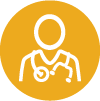Whether you have recently been diagnosed with cancer or are concerned about your risk, understanding your own family history is important. However, this requires a basic understanding of how genes work.
The nucleus is at the center of almost every cell in your body. It is helpful to think of this as the gene’s control center. Inside of the nucleus are 23 pairs of chromosomes containing genes. Human beings have approximately 25,000 genes. These are coded messages that dictate how cells behave. Genes control how your body grows and develops from birth.
Cancer is the Result of Faulty Genes
Cancer occurs when something has gone wrong with one or more of the genes in a cell. Gene changes are called mutations or faults. Typically, a cell must have at least six mutations before cancer develops. When that happens, it can divide rapidly and grow uncontrollably. Most changes to genes happen during a person’s lifetime, but a parent can also pass along gene mutations to his or her children. Acquired mutations, such as those that occur due to smoking or excessive sun exposure, cannot be passed to children.
Genes normally protect people from cancer by correcting DNA damage when cells divide. In the case of cancer genes, also called cancer susceptibility genes, the inherited mutation prevents repair of damaged DNA cells. Cancer can develop due to this.
You inherit 23 chromosomes from your mother and 23 from your father. If one of your parents has a gene mutation, you have a 50 percent chance of acquiring it yourself. Although this can increase your risk of cancer, it doesn’t mean you will absolutely develop it. In addition to your higher risk, you are more likely to develop cancer at an earlier age than normal if you inherited a gene mutation. This is known as having a genetic pre-disposition to cancer.
Occurrence of Cancer Caused by an Inherited Gene Mutation
According to the American Cancer Society, cancer caused by an inherited defective gene accounts for 5-10 percent of all cancers diagnosed. Aging, chance, lifestyle factors, and environmental factors play a much larger role in the development of cancer. Additionally, different types of gene faults cause more cases of cancer than others.
If you’re concerned about inheriting a specific type of cancer from a parent, a genetic specialist may be able to test for the following types:
- Bowel
- Breast
- Kidney
- Melanoma
- Ovarian
- Pancreatic
- Prostate
- Retinoblastoma
- Thyroid
- Uterine
- Womb
Cancer is a common disease and occurs most frequently as the result of aging. Having family members diagnosed with cancer after age 60 doesn’t increase your risk at all. When considering your own risk, look at who in your family has or had cancer and their age at diagnosis.
Your risk is higher if your family history contains any of the following:
- A close blood relative has discovered a gene mutation after having a genetic test
- Two or more relatives on your mother’s or father’s side of the family have had cancer, such as an aunt, uncle, or grandparent
- Your relatives have been diagnosed with the same type of cancer or different variations of cancer caused by the same genetic fault
- The family members developed cancer at age 50 or younger
Non-Familial Risk Factors
Since 90 to 95 percent of cancers occur for reasons other than genetics, it’s important to understand the risks and control what you can. For example, choose not to smoke, practice smart sun safety habits, and maintain a healthy body weight. Some known risk factors, such as getting older, are out of your control. Even so, we encourage you to speak to your doctor about your likelihood of developing cancer as well as what you can do to lower your risk. He or she may recommend a screening test such as a mammogram or colonoscopy or prescribe a specific medication.
Your care team at the Cecil B. Highland, Jr. and Barbara B. Highland Cancer Center at UHC welcomes your questions at any time. We will also help you locate additional resources to help manage your risks and deal with cancer.
Please note, the information provided throughout this site is not intended or implied to be a substitute for professional medical advice, diagnosis or treatment. All content, including text, graphics, images, and video, on or available through this website is for general information purposes only. If you are experiencing related symptoms, please visit your doctor or call 9-1-1 in an emergency.

